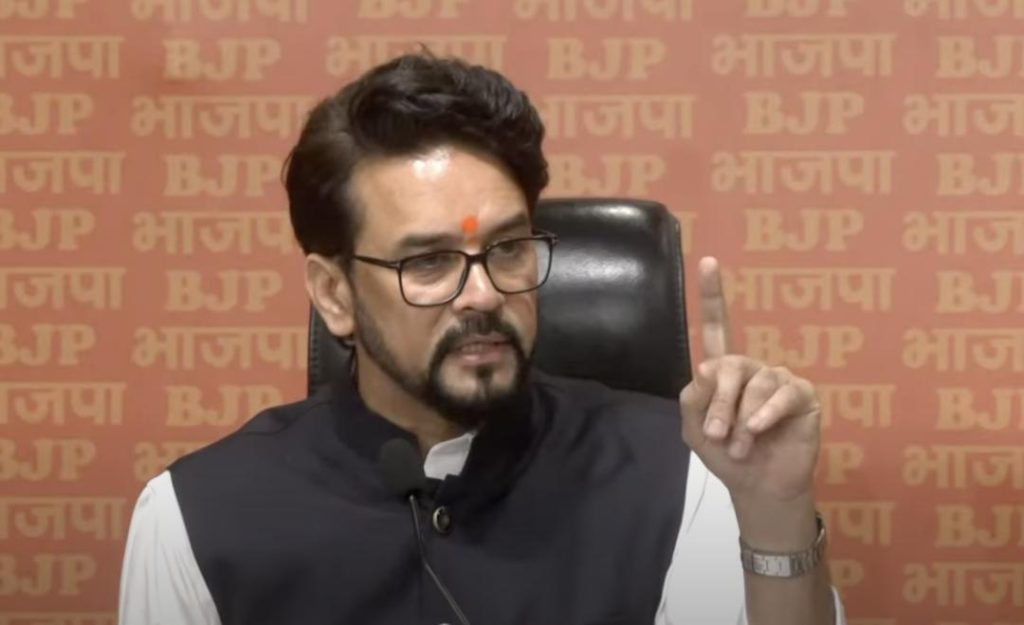
Congress & CPI made Bhimrao Ambedkar lose the poll in 1952: BJP
The Indian political landscape has witnessed numerous significant events and controversies over the years. One such incident that has recently gained attention is the claim made by BJP MP Anurag Thakur that the Congress and CPI (Communist Party of India) conspired to defeat Dr. Bhimrao Ambedkar in the 1952 general elections. According to Thakur, this was the first instance of electoral corruption in Indian politics.
Dr. Bhimrao Ambedkar, a renowned leader and a key figure in the Indian independence movement, was a stalwart in the Indian political landscape. He served as the Chairman of the Drafting Committee of the Indian Constitution and played a crucial role in drafting the document. Ambedkar was also a strong advocate for the rights and welfare of Dalits and other marginalized communities.
The claim made by Anurag Thakur has sparked a heated debate, with many questioning the veracity of the statement. However, it is essential to examine the context and facts surrounding the 1952 general elections to understand the circumstances that led to Ambedkar’s defeat.
The 1952 general elections were held in India shortly after the country gained independence. The elections were a significant milestone in Indian politics, marking the first instance of a democratic exercise in the country. The Indian National Congress (INC), led by Jawaharlal Nehru, was the dominant force in the elections, with the Communist Party of India (CPI) being the main opposition party.
Dr. Bhimrao Ambedkar, who was the leader of the Scheduled Castes Federation, contested the elections from the Bombay constituency. However, his campaign was marred by allegations of corruption and irregularities. The Congress and CPI, which were bitter political rivals, allegedly conspired to defeat Ambedkar to eliminate a strong opponent.
Thakur’s statement suggests that the Congress and CPI together managed to defeat Ambedkar by 74,333 votes, with 74,333 votes being rejected. This claim has been met with skepticism by many, who argue that the figures provided by Thakur are incorrect. However, it is essential to examine the actual voting patterns and results of the 1952 elections to understand the circumstances surrounding Ambedkar’s defeat.
The actual results of the 1952 general elections showed that Dr. Bhimrao Ambedkar lost the election to the Congress candidate, Yashwantrao Chavan, by a margin of 22,451 votes. The CPI, which contested the elections as an opposition party, did not win a single seat in the Bombay constituency.
It is apparent that Thakur’s statement is inaccurate, and the actual results of the election do not support his claim. However, the claim itself highlights the deep-seated political rivalries and tensions that existed during the early years of Indian democracy. The Congress and CPI were bitter opponents, and the elections were marked by intense political competition and allegations of corruption.
The claim made by Anurag Thakur also raises important questions about the nature of Indian democracy and the role of political parties in shaping the country’s political landscape. The Indian National Congress, which was the dominant force in Indian politics during the early years of independence, has been accused of electoral corruption and manipulation in several elections.
The 1952 general elections were no exception, with allegations of rigging and irregularities being reported from several constituencies. The Congress party’s dominance in the elections was largely due to its organizational strengths and its ability to manipulate the electoral process.
In conclusion, the claim made by Anurag Thakur that the Congress and CPI conspired to defeat Dr. Bhimrao Ambedkar in the 1952 general elections is inaccurate and lacks concrete evidence. However, it highlights the deep-seated political rivalries and tensions that existed during the early years of Indian democracy. The 1952 general elections were a significant milestone in Indian politics, marking the first instance of a democratic exercise in the country. The elections were marked by intense political competition and allegations of corruption, which continue to shape the country’s political landscape to this day.
News Source:






